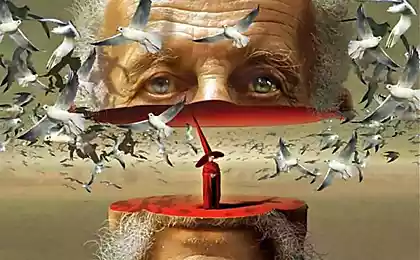499
Concern: How to distinguish it from the different kind of manipulation?
The greatest gift one person can give another is a recognition of the fact that you cause another person's positive experiences.Or, if to take wider — the fact of your existence someone cares, and it doesn't even matter in a positive or in a negative sense. No wonder that for the child, the most unbearable, the parents ' behavior is not anger (though it's not pleasant), and a full, icy indifference. It is important that we are seen as living, experiencing beings with their needs, rather than as the objects of influence. That is why the most important component of our relationships is to care. Oddly enough, about it is very little what you write. Twenty seven million eight hundred eighty one thousand four hundred forty eight
How to identify a concern?
How to distinguish it from the different kind of manipulation, hiding under the concern, but it is not? For example, for me personally, is one of the most touching care about me? It comes to mind suddenly brought me a hot tea with pancakes in the cold, still unheated apartment. I didn't ask about it, and thought about tea.
Just the wife suddenly thought of me, and decided, in such a chilly day I would be good with this tea and pancakes... And I'm getting really nice, warm inside — and not the tea itself, but due to the fact that someone cared about my condition, and he/she cared. When I asked the interviewees about the most sunken into the soul of the examples of caring for them, they usually remember very simple things and they are usually not expected at the moment when it was committed. Plaid frozen shoulders and stiff hands large and warm hands (a lot of memories that literally have been associated with warming); the unexpected offer of a friend to help — and it is when this help is needed, and the other is not obliged to do this, and didn't ask him about it. The man who stopped his car and released him to help the elderly woman get through the slippery road…
It turns out that caring is an action that conveys to another person the message "I see that something is happening and I don't care". In other words, caring is an action, defined primarily by the needs and experiences of the one to whom it is directed, not who cares. "I see that you're cold, and I think you would look good with tea and a blanket". And this "I think... it would be" lies the difference concerns what it is not.
Because often under the care lies manipulation aimed at gaining control over another person. Disguised control is: "I see that something is happening, I do care, and I even know better than you what you need." There is another option: "if you don't accept so-and-so, I am very offended because I want to take care of you, and you do not give." In both cases, the main are not the needs of the other and "caring" good to cause another to feel better. Taking care we offer ourselves, controlling — imposed, breaking resistance. For many synonymous with pseudocavity are grandma's/aunt's/mom's pies, which are already using "can't" pushed in the stomach, otherwise grandma/aunt/mom will be offended, "she's ready".
That is the first pitfall concerns the substitution of satisfying someone else's needs your own. The second pitfall is the illusion of "mind reading". Yes, we are sometimes unable to respond to an unconscious desire for another man and hit a bull's eye, guessing what a man wants, and this is one of the most pleasant experiences for us. However, this is rare. Most concern is still the satisfaction of expressed desires, and guessing is the icing on the cake, not the cake.
If people concentrated on guessing, just the whole cake-and impaired, goes under the category of "the way it should be." The requirement of "give me what I say, but what you have to guess," is the strongest stimulus. So strong that often people start to use two close to each other's strategies of avoidance of this stimulus. This strategy of "your problem" and the strategy of "all care, but only upon specific request".
"Your problem" is brilliantly illustrated by this anecdote.
The wife says to her husband:
— Our roommate is pregnant!
— It's her problem.
— Say: from you!
— This is my problem.
— What people will say?
— It's their problem.
— What do I do?
And this is your problem.
The essence of this strategy:
I am in no way going to participate in the resolution of your problems, because you quite himself/herself can take care of myself, even if I am part of the problem. Well, we're all adults and "self-sufficient". Often it (can take care of myself) do so, but in such a position absent at least some movement towards the other person.Yes, the problem is mine, but then you... you why?
Second strategy:
asked — did. Everything. Again to perform the same action required to re-request. Without it nothing is done, even if you know that circumstances have not changed, and the person needs help. You need to — you ask: it is, but again there is no movement forward, the attempts of independent initiatives to meet the already known needs of the other person. Ask — will do as well — no. Again it is formally true about independent adults who can't read the minds of others. But warmth in these relations is also very small. We want people to went to meet themselves, not the signal…
To demand from another man something I can't. Especially ridiculous to demand care. Ask — Yes, this is possible, while keeping the other person the right to choose how to respond and what not.A relationship built on requirements and sanctions that may follow for failure to comply, has in fact collapsed, it's Frankenstein, artificially created creature. It's moving, but something. However, to be a suppliant in our culture is bad, it implies dependence. To ask about caring? What do you mean. To admit his weakness, his neediness, and neediness something automatically (and incorrectly!) is equivalent to dependency, which in turn (and also incorrect) is automatically considered to be something very bad in all cases.
There is another aspect associated with the message, "I see what's going on with you, and I care": we don't always know how to Express that "I care". Partly because there is no experience of non-Intrusive care and support as Intrusive (remembering someone else's manipulative "help") do not want to be. What, for example, to say to comfort a grieving person, to not devalue his experience, but not to fall into false pathos? Make him feel that you care about his grief?
Sometimes it's hard to find words or actions that people sometimes just do nothing and creates the illusion that they care... But for the feeling of care and support does not necessarily need a lot. What if contact with the message: I see that you're hurt and I want and willing to help, just don't know how. How can I support you? There's no compulsion, there is no solution for the other person what he needs — but there is a sincere desire to be a part of someone else's emotional life. And then there is the opportunity to experience that for the other there is our inner world, our feelings and thoughts, and listen. And that may be enough. It is important not to forget to know about that other person — it is also important is how we respond to his concern.
PS Write in the comments if you would like some personal example is very warm and cares about you — or your other. It would be great.published
Author: Ilya Latypov
P. S. And remember, only by changing their consumption — together we change the world! © Join us at Facebook , Vkontakte, Odnoklassniki
Source: tumbalele.livejournal.com/103092.html
How to identify a concern?
How to distinguish it from the different kind of manipulation, hiding under the concern, but it is not? For example, for me personally, is one of the most touching care about me? It comes to mind suddenly brought me a hot tea with pancakes in the cold, still unheated apartment. I didn't ask about it, and thought about tea.
Just the wife suddenly thought of me, and decided, in such a chilly day I would be good with this tea and pancakes... And I'm getting really nice, warm inside — and not the tea itself, but due to the fact that someone cared about my condition, and he/she cared. When I asked the interviewees about the most sunken into the soul of the examples of caring for them, they usually remember very simple things and they are usually not expected at the moment when it was committed. Plaid frozen shoulders and stiff hands large and warm hands (a lot of memories that literally have been associated with warming); the unexpected offer of a friend to help — and it is when this help is needed, and the other is not obliged to do this, and didn't ask him about it. The man who stopped his car and released him to help the elderly woman get through the slippery road…
It turns out that caring is an action that conveys to another person the message "I see that something is happening and I don't care". In other words, caring is an action, defined primarily by the needs and experiences of the one to whom it is directed, not who cares. "I see that you're cold, and I think you would look good with tea and a blanket". And this "I think... it would be" lies the difference concerns what it is not.
Because often under the care lies manipulation aimed at gaining control over another person. Disguised control is: "I see that something is happening, I do care, and I even know better than you what you need." There is another option: "if you don't accept so-and-so, I am very offended because I want to take care of you, and you do not give." In both cases, the main are not the needs of the other and "caring" good to cause another to feel better. Taking care we offer ourselves, controlling — imposed, breaking resistance. For many synonymous with pseudocavity are grandma's/aunt's/mom's pies, which are already using "can't" pushed in the stomach, otherwise grandma/aunt/mom will be offended, "she's ready".
That is the first pitfall concerns the substitution of satisfying someone else's needs your own. The second pitfall is the illusion of "mind reading". Yes, we are sometimes unable to respond to an unconscious desire for another man and hit a bull's eye, guessing what a man wants, and this is one of the most pleasant experiences for us. However, this is rare. Most concern is still the satisfaction of expressed desires, and guessing is the icing on the cake, not the cake.
If people concentrated on guessing, just the whole cake-and impaired, goes under the category of "the way it should be." The requirement of "give me what I say, but what you have to guess," is the strongest stimulus. So strong that often people start to use two close to each other's strategies of avoidance of this stimulus. This strategy of "your problem" and the strategy of "all care, but only upon specific request".
"Your problem" is brilliantly illustrated by this anecdote.
The wife says to her husband:
— Our roommate is pregnant!
— It's her problem.
— Say: from you!
— This is my problem.
— What people will say?
— It's their problem.
— What do I do?
And this is your problem.
The essence of this strategy:
I am in no way going to participate in the resolution of your problems, because you quite himself/herself can take care of myself, even if I am part of the problem. Well, we're all adults and "self-sufficient". Often it (can take care of myself) do so, but in such a position absent at least some movement towards the other person.Yes, the problem is mine, but then you... you why?
Second strategy:
asked — did. Everything. Again to perform the same action required to re-request. Without it nothing is done, even if you know that circumstances have not changed, and the person needs help. You need to — you ask: it is, but again there is no movement forward, the attempts of independent initiatives to meet the already known needs of the other person. Ask — will do as well — no. Again it is formally true about independent adults who can't read the minds of others. But warmth in these relations is also very small. We want people to went to meet themselves, not the signal…
To demand from another man something I can't. Especially ridiculous to demand care. Ask — Yes, this is possible, while keeping the other person the right to choose how to respond and what not.A relationship built on requirements and sanctions that may follow for failure to comply, has in fact collapsed, it's Frankenstein, artificially created creature. It's moving, but something. However, to be a suppliant in our culture is bad, it implies dependence. To ask about caring? What do you mean. To admit his weakness, his neediness, and neediness something automatically (and incorrectly!) is equivalent to dependency, which in turn (and also incorrect) is automatically considered to be something very bad in all cases.
There is another aspect associated with the message, "I see what's going on with you, and I care": we don't always know how to Express that "I care". Partly because there is no experience of non-Intrusive care and support as Intrusive (remembering someone else's manipulative "help") do not want to be. What, for example, to say to comfort a grieving person, to not devalue his experience, but not to fall into false pathos? Make him feel that you care about his grief?
Sometimes it's hard to find words or actions that people sometimes just do nothing and creates the illusion that they care... But for the feeling of care and support does not necessarily need a lot. What if contact with the message: I see that you're hurt and I want and willing to help, just don't know how. How can I support you? There's no compulsion, there is no solution for the other person what he needs — but there is a sincere desire to be a part of someone else's emotional life. And then there is the opportunity to experience that for the other there is our inner world, our feelings and thoughts, and listen. And that may be enough. It is important not to forget to know about that other person — it is also important is how we respond to his concern.
PS Write in the comments if you would like some personal example is very warm and cares about you — or your other. It would be great.published
Author: Ilya Latypov
P. S. And remember, only by changing their consumption — together we change the world! © Join us at Facebook , Vkontakte, Odnoklassniki
Source: tumbalele.livejournal.com/103092.html
Interesting ideas for small bathroom
Utopian modern life without the smartphone in the photos Eric Pickersgill























